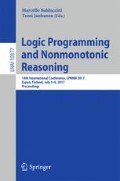Abstract
We describe the new version of the PDDL-to-ASP translator plasp. First, it widens the range of accepted PDDL features. Second, it contains novel planning encodings, some inspired by SAT planning and others exploiting ASP features such as well-foundedness. All of them are designed for handling multi-valued fluents in order to capture both PDDL as well as SAS planning formats. Third, enabled by multi-shot ASP solving, it offers advanced planning algorithms also borrowed from SAT planning. As a result, plasp provides us with an ASP-based framework for studying a variety of planning techniques in a uniform setting. Finally, we demonstrate in an empirical analysis that these techniques have a significant impact on the performance of ASP planning.
Access this chapter
Tax calculation will be finalised at checkout
Purchases are for personal use only
Notes
- 1.
Available at: https://github.com/potassco/plasp.
- 2.
The encodings given in Sect. 2 focus on STRIPS-like planning tasks with multi-valued fluents as well as mutex groups, where the latter have been omitted for brevity. In contrast to the ease of incorporating mutex groups, extending parallel encodings to conditional effects or axiom rules is not straightforward [15], while sequential encodings for them are shipped with plasp.
References
Baral, C., Gelfond, M.: Reasoning agents in dynamic domains. In: Logic-Based Artificial Intelligence, pp. 257–279. Kluwer (2000)
Biere, A., Heule, M., van Maaren, H., Walsh, T.: Handbook of Satisfiability. IOS (2009)
Bomanson, J., Gebser, M., Janhunen, T., Kaufmann, B., Schaub, T.: Answer set programming modulo acyclicity. Fundamenta Informaticae 147(1), 63–91 (2016)
Dimopoulos, Y., Nebel, B., Koehler, J.: Encoding planning problems in nonmonotonic logic programs. In: Steel, S., Alami, R. (eds.) ECP 1997. LNCS, vol. 1348, pp. 169–181. Springer, Heidelberg (1997). doi:10.1007/3-540-63912-8_84
Gebser, M., Kaminski, R., Kaufmann, B., Ostrowski, M., Schaub, T., Wanko, P.: Theory solving made easy with clingo 5. In: Technical Communications, ICLP, pp. 2:1–2:15. OASIcs (2016)
Gebser, M., Kaminski, R., Kaufmann, B., Schaub, T.: Clingo = ASP + control: Preliminary report. In: Technical Communications, ICLP (2014). arXiv:1405.3694
Gebser, M., Kaminski, R., Knecht, M., Schaub, T.: plasp: a prototype for PDDL-Based planning in ASP. In: Delgrande, J.P., Faber, W. (eds.) LPNMR 2011. LNCS (LNAI), vol. 6645, pp. 358–363. Springer, Heidelberg (2011). doi:10.1007/978-3-642-20895-9_41
Gebser, M., Kaufmann, B., Otero, R., Romero, J., Schaub, T., Wanko, P.: Domain-specific heuristics in answer set programming. In: Proceedings AAAI, pp. 350–356. AAAI (2013)
Gelfond, M., Lifschitz, V.: Action languages. Electron. Trans. Artif. Intell. 3(6), 193–210 (1998)
Helmert, M.: The fast downward planning system. J. Artif. Intell. Res. 26, 191–246 (2006)
Kautz, H., McAllester, D., Selman, B.: Encoding plans in propositional logic. In: Proceedings of KR, pp. 374–384. Morgan Kaufmann (1996)
Lifschitz, V.: Answer set programming and plan generation. Artif. Intell. 138(1–2), 39–54 (2002)
McDermott, D.: PDDL – the planning domain definition language. TR Yale (1998)
Rintanen, J.: Madagascar: scalable planning with SAT. In: Proceedings of IPC, pp. 66–70 (2014)
Rintanen, J., Heljanko, K., Niemelä, I.: Planning as satisfiability: parallel plans and algorithms for plan search. Artif. Intell. 170(12–13), 1031–1080 (2006)
Son, T., Baral, C., Nam, T., McIlraith, S.: Domain-dependent knowledge in answer set planning. ACM Trans. Comput. Logic 7(4), 613–657 (2006)
Wehrle, M., Rintanen, J.: Planning as satisfiability with relaxed \(\exists \)-step plans. In: Proceedings of AI, pp. 244–253. Springer, Heidelberg (2007)
Acknowledgments
This work was partially funded by DFG grant SCHA 550/9.
Author information
Authors and Affiliations
Corresponding author
Editor information
Editors and Affiliations
Rights and permissions
Copyright information
© 2017 Springer International Publishing AG
About this paper
Cite this paper
Dimopoulos, Y., Gebser, M., Lühne, P., Romero, J., Schaub, T. (2017). plasp 3: Towards Effective ASP Planning. In: Balduccini, M., Janhunen, T. (eds) Logic Programming and Nonmonotonic Reasoning. LPNMR 2017. Lecture Notes in Computer Science(), vol 10377. Springer, Cham. https://doi.org/10.1007/978-3-319-61660-5_26
Download citation
DOI: https://doi.org/10.1007/978-3-319-61660-5_26
Published:
Publisher Name: Springer, Cham
Print ISBN: 978-3-319-61659-9
Online ISBN: 978-3-319-61660-5
eBook Packages: Computer ScienceComputer Science (R0)

